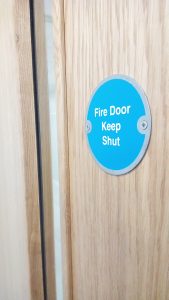Being in the hotel sector, you will be acutely aware of the challenges of managing all the elements of fire safety in often complex buildings, but how sure are you that your fire doors are compliant and are you fulfilling all your Passive Fire Protection requirements?
Two catastrophic hotel blazes in the last month, at Bristol and Walsall, completely destroyed both hotels and have raised serious questions about the Passive Fire Protection systems within them.
Passive Fire Protection essentially creates fire resistant compartments within a building – a process known as compartmentation – by using appropriate materials in the construction of the separating walls, floors and ceilings. This contains fire within the individual compartment for a certain period of time, dependent on the design criteria. The main purpose of this is to give occupants time to escape, but also to give the fire services a better chance of containing and extinguishing the fire and possibly saving the building.
It stands to reason that if a compartment is working properly, it will contain a fire for, say, 60 minutes, before the fire spreads to the next compartment – and so on. For fires to spread so rapidly in two relatively modern buildings that they were completely destroyed within hours – even considering the lack of sprinklers – is extremely concerning.
Fire doors and ‘fire stopping’ are critical elements of the compartmentation of buildings.

Fire Stopping is the sealing of weak points in a compartment wall caused by, for example, service pipes or cables passing through a wall, or a linear joint between fire resistant sections. Many buildings have had modifications or repair work done that has resulted in these seals being compromised – and it only takes a matter of minutes for fire to break through even the tiniest of holes. It is crucial that these fire-resistant seals are installed as part of any new or remedial work.
Fire doors are intended to provide the same level of fire resistance as their surrounding walls – but they can only do this if they are closed – and if their fire-resistant components and properties are fully compliant and functional AS A WHOLE. As with fire stopping, even the tiniest flaw in the complete door assembly can be exploited by fire very rapidly.

Although they are classified as ‘passive’ fire safety equipment, fire doors probably need more attention and maintenance than any of the ‘active’ elements (fire alarms, sprinklers and extinguishers). They are complex engineered products that are effective only when all the components are compatible and functional and, because they are in constant use, they really do need regular attention – like any mechanical product.
Unfortunately, the available data tells us that, despite the existence of fire risk assessments and in-house maintenance teams, fire doors remain a significant area of concern. Over 61% failed compliance checks due to improper installation, downgrades on the specification, insufficient maintenance, damage and inappropriate repairs – indicating a widespread lack of understanding of the regulatory standards that apply to fire doors and the problems that commonly arise with them.
The investigations in to these two hotel fires are in their early stages, but few in the fire safety sector are going to be surprised if Passive Fire Protection, compartmentation and fire doors feature prominently in their outcomes.
The question is – are you, the hotel owner or operator, confident that your Passive Fire Protection is compliant and functional? When was it last inspected by a competent person with relevant, recognised accreditation? Will your insurance pay out if you can’t prove due diligence? Can you afford the loss of your assets, business revenue and reputation caused by a fire like this? Do you want to be prosecuted for fire safety breaches? Most of all, do you want have a fatality or injury on your conscience?
If the answer to any of these questions is NO, then you need to take action.
So how can Worksmart Fire Door Inspection help you avoid these scenarios?
- We provide a range of services from one off inspections to complete turn-key maintenance contracts – freeing up your time and energy and guaranteeing that you are being duly diligent.
- Worksmart is affiliated to and certificated by two UKAS accredited bodies – the FDIS (Fire Door Inspection Scheme), the BM Trada Q Mark Fire Door Maintenance Scheme and the BM Trada Q Mark Fire Stopping Installation Scheme – so you can be sure you have entrusted this safety critical work to properly competent people as defined by law.
- All our surveyors and tradespeople are specially trained in the specific requirements for these disciplines and we adhere to strict procedures, including spot checks and verification of methods and materials at key points of every project. We are also regularly audited to ensure our processes and work comply with the requirements of these schemes, but also, and most importantly, comply with the regulations and standards.

Worksmart have developed these services to provide peace of mind to people like you – with responsibility for fire safety – allowing you to focus on driving your business safe in the knowledge that you have done everything you can to ensure the safety of your staff and guests.
I would be delighted to come along to do a presentation if you would like, or simply have a chat and leave some information for you.
If you would to get in touch to find out morem, please contact Mark McQuade at [email protected] or call 01563 53 55 11
In the meantime, feel free to browse our website.
You can find us on Twitter and LinkedIn with the following hashtags: ProtectingLivesPreventingLoss #Worksmartworksafe #Firedoormaster #MakeItWorksmart






